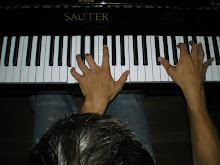i stand behind the claim that cognition is recognition, in some form or another. The argument goes into human cognitive theory and epistemology, which i dont want to get into because im pretty much ignorant of most of the subject, BUT if we accept this concept (sounds sound enough to me) then there are certain concepts relating to music, 20th century music, which should be mentioned.
The seralists will have a serious problem if they accept this claim. If the listener can not recognize something in the music, if the pattern can not be deciphered auditorily (since the medium of music is sound, not images), then it is failing to give the listener much intellectual material to work with, aside from pure sonic material. It makes perfect sense that most people, even many serious musicians, have trouble enjoying 12 tone music.
How can we really cognitize music that never gives us something to recognize? I once became thrilled in the middle of a Schoenberg concert because i recognized the tone row... briefly, then it went away and i never heard it again. I then fell back into a strange state boredom - interested in the sounds themselves and not interested in the music beyond that. The same is true often in the avant-garde, im fascinated by the sonic experiences but the musical material is often uninteresting. (the counter to this is that there is no division between musical material and sonic experiences, that they are one in the same)
In Berg its understandable, since he imprinted serialism with such passion, in Webern, even, understandable, since he discovered new possibilities in sound and a different mode of intensity and expression (however cryptic) all together. But still, to enjoy the webern and the berg to a greater extent i have to hear the music more than once. I will go Anablog and open one of those windows and listen to about 5 minutes of a 30 second Webern piece. Im not really comfortable leaving one before that
.
So it could turn out, surprisingly, that repetiton in some form actually increases intellectual stimulation for the listener instead of diminishing it, that for the listener, a chopin ballade may use more brain power than the most solidly intellectual piece of Boulez, more interest for our intellect than something that never repeats or is unrecognizable.
Lahti
2 years ago

4 comments:
blog surfing....came across this...refreshing to read that a college student can think critically about music...your conclusion that repetition is linked to he enjoyment of music is hitting the bulls-eye. my taek on teh serialists and most 20th centuray experimentalism is that they were all seeking something primitive...perhasp the first twang of a bow string as a hunter rested his bos on a hollow log 8 millenia ago. there is a theory put forth that bach drove himself nuts with the twelve well tempered tones he created for the keyboard, lutenists of the age before him had worked out a harmony with bigger intervals..if not so many keys. the mathematics of it all did something to first off expand the developmental possibilities of the classical age and the romantic decadence that followed...then more or less force the mindboggling but rather inventive approach of 12 tone music. bartok sadi that the real inspiration must come from the folk
...adn the folk no repetition like no one else. keep the current going i think you're on to something. one question: did jazz die after duke ellington?
adn sorry about the typos going way to fast tonite
I don't know enough about 'cognitive theory' to say much about the bedrock of your post, but if you're saying "Serial music isn't popular because human brains aren't built to hear mutating tone rows, and that's the root of the whole style" then, well, I agree.
I've had the same experience in listening to a piece over and over to get past the opaque harmony. After a while I can usually find some pleasure and musicality in the 'gestures' of the piece, but I remain very suspicious: I think I could listen to a recording of a traffic jam over and over until I found something to like, too. Once something becomes familiar, my brain can usually find a sort of 'artistry' in it. And, of course, maybe serialism isn't supposed to be 'beautiful' or 'give pleasure' in the first place- I can't decide if that's a get-out-of-jail-free card for art or not.
In the end, I've come to think that, like it or not, we're programmed to respond to the sounds of more traditional tonal and modal music- composers can play with tension and release using that vocabulary in a way that's currently sealed off from serialism and the avant gard.
That's just my personal opinion, of course.
"your conclusion that repetition is linked to he enjoyment of music is hitting the bulls-eye"
its not that repetition is linked to enjoyment, but actually, that repetition is linked to the cognition of music
i'll try to get back to more of these comments a little later... thanks anon and trevor for writing them!
Post a Comment